- Home
- Jeremy Robinson
Island 731 Page 3
Island 731 Read online
Page 3
Joliet opened her mouth to speak, but Hawkins knew it was too soon. He placed his hand against hers. Her voice caught in her throat, but when he glanced at her she appeared more confused than angry, which is what he expected. They’d become friends over the past month at sea, but Joliet couldn’t stand to be told what to do. Only Drake got away with it, and sometimes not without a fight.
Drake turned to the bystanders and pointed to the four standing nearest the turtle. “You four. Take Stumpy here to the biolab.”
The four grumbled, but immediately began working out how to transport the creature. The biolab was on the main deck, so they wouldn’t need to go up or down any stairs, but the several-hundred-pound dead weight still wouldn’t be easy to move.
Drake turned his attention back to Hawkins and Joliet. He looked each of them in the eyes and said, “You two, wash up and come see me on the bridge in thirty. We need to talk.”
With that, Drake spun on his heels and stormed away. The man had let them off the hook without a public verbal beatdown, but Hawkins couldn’t help but feel he might have been better off staying in the water with the shark.
3.
Hawkins washed himself clean in just over a minute. Showers were supposed to be brief while at sea, so he used the rest of his allocated five minutes to languish under the hot streams of water. The close encounter with the great white had bunched up the muscles on his back and the heat helped relieve the tension. As steam billowed around him in the small shower stall, he took a moment to reflect.
Today marked the third time in his life that he’d looked down the throat of an animal intent on sinking its teeth into him. The first had been as a child when he was attacked by a rabid raccoon. He’d been standing in his driveway, trying desperately to sink a basketball shot, but his seven-year-old arms weren’t up to the task. He first noticed the scrawny raccoon as it walked past him, in broad daylight, carrying a bagel pilfered from a neighbor’s trashcan. If not for a missed shot, the raccoon may have continued on its way, oblivious to Hawkins’s presence, but the ball landed just a few feet from the animal’s side.
The sharp thunk of the ball hitting the pavement had the same effect a hand grenade might have. The raccoon launched itself into the air, arms splayed, bagel twirling away. At some point during its twisting flight, the raccoon must have seen Hawkins because upon landing, it shrieked and launched toward him. If not for his father’s nearby minivan and Hawkins’s monkeylike climbing skills, the coon might have enjoyed a much fresher snack. But thanks to his father, armed with a broom and trashcan cover, Hawkins escaped unscathed. In some ways it was a good memory, since it was one of the few nice things his father did before deciding not to be his father anymore.
He wasn’t so lucky during his second confrontation with a hungry mammal. Hawkins ran his fingers over his bare chest. The four long scars had healed long ago, but still stung under his touch. Not from any physical pain. It had been five years since that dark day in the woods of Colorado, but the memory of that confrontation still felt fresh.
A loud banging snapped him out of his reverie. “Five minutes!” The voice belonged to Bob Bray, his roommate aboard the Magellan. The Massachusetts native was a high school science teacher, and spoke like a man used to fighting to be heard—very loudly. Despite his cacophonous disposition, he was regarded as one of the leading teachers in the country and had written three books, two of them on what he called “incarceration-style learning” and “experience over textbooks.” He promoted experience-based learning at the high school level and had taken a sabbatical of sorts to join the Magellan’s crew. His goal was to see how much more he could learn about the ocean and its denizens than he could if he just read the typical high school or even college textbook.
Bray’s third and most popular book, Sinister Science, was a graphic, nonfiction account of science gone awry throughout the course of human history, including sections on church-altered science, torture—both ancient and modern—chemical and biological warfare, and experimentation of all sorts. He’d brought a copy on board for anyone who was interested, but the photos and illustrations turned most people away. The study was intensely dark, which was appropriate given the subject matter, but it caught most people off guard because Bray was generally a pretty happy guy.
“What’re you doing in there?” Bray banged on the thin shower stall wall again. “Wait. No. I don’t want to know.”
“I’m coming, I’m coming,” Hawkins said. “You do the same thing to kids in the locker room?”
“I teach biology,” Bray said. “I’ve never set foot in the locker room.”
Hawkins took his towel from the shower door and quickly dried his upper torso. He threw on a T-shirt and wrapped the towel around his waist before stepping out into the small bathroom known to seafarers as “the head.” Bray stood in the doorway, holding on to the doorframe above his head. In addition to being loud, the man had issues with personal space, but Hawkins had become accustomed to it. “How come you can say ‘room’ just fine, but not ‘locker’? Lockah. Lockah room.”
“You’re wicked funny,” Bray said with a grin. “So that shark was crazy.”
“Shahk.”
“I’m being serious,” Bray said. “You could have died.”
“I didn’t,” Hawkins said.
Bray grinned fiendishly. “You did it for her, didn’t you?”
Hawkins applied a liberal amount of deodorant. It would be a week before his next shower. “You’ve already determined the turtle was a female?”
“Joliet, asshole. She’s a little too flat for me, but—”
Hawkins raised an eyebrow. “Flat?”
“Kind of boyish. I prefer something to hold on to.”
“I can’t believe the next generation is going to be taught by you,” Hawkins said.
“Men have a natural proclivity toward women with wide hips and large breasts. Child-bearing hips. This is like Biology 101 here. The real weirdos are guys like you, who prefer boyish waifs like Joliet. Makes me wonder if you’re not, you know—” Bray raised his eyebrows a few times and gave him a wink.
“Hey, I’m not the one keeping a half-naked man from leaving the bathroom, am I?”
Bray quickly lowered his arms and backed out of the doorway. He was a big man, standing six-five, and while not completely out of shape, he sported a belly he called a “keg-pack.” His short-cut black hair and round cheeks gave him the look of an oversize dwarf, a fact that had earned him the nickname “Eight,” as in Snow White’s eighth dwarf. “You’re not half naked. You’re wearing a T-shirt. Why do you do that, anyway? I’ve never seen you without a shirt on.”
Hawkins slipped past Bray and entered their small room. “Gotta give you something to fantasize about. Keep the mystery alive.”
Bray grunted and turned away when Hawkins dropped his towel, but he didn’t leave. “So are you in the shitter with Drake, or what?”
“Not sure,” Hawkins said, pulling up his boxers.
“He looked pissed.”
“You’re not helping.”
“If you know your enemies and know yourself, you can win a hundred battles without a single loss.”
Hawkins quickly put on a pair of cargo shorts. “You’re a man of wisdom if ever there was one.”
“That’s Nichee or something.”
“Nietzsche, and it wasn’t.” Hawkins slipped into a pair of boat shoes. He’d gone barefoot a lot lately, but felt he should dress up for the meeting with Drake. “I thought you were a history buff?”
“Scientific history,” Bray corrected. “I wouldn’t call myself a connoisseur of philosophy.”
Hawkins smiled. “By the way, that wasn’t philosophy. You were quoting Sun Tzu’s Art of War.”
“Really? Awesome.”
“Just awesome? Not ‘wicked awesome’?” Hawkins quickly rubbed the towel over his short brown hair and hung it over the end of his top bunk.
“Funny. Hey, I’ll be in the biolab when you’re d
one getting verbally spanked. Your boy toy—Joliet, sorry—asked me to prep the loggerhead for dissection. You coming, Ranger?”
Hawkins smiled at the nickname. It had been five years since he was a ranger at Yellowstone Park, but once the crew found out, it stuck. “I’ll be there, Eight.”
Bray opened the room’s door to leave and stumbled back. Joliet stood there, her face serious.
“Shit, ahh, you couldn’t hear us, right?” Bray wrapped on the door with his knuckles. It bonged loudly. “We were having a private talk. Guy stuff.”
Joliet, who was nearly two feet shorter than Bray, leaned her head around his chest. “Coming?”
“You heard, didn’t you?” Bray said, backing slowly out the door. “I’m going to go now.” He hustled away, glancing over his shoulder twice like Joliet might pounce on him, then disappeared around the staircase.
“You didn’t hear a thing,” Hawkins said, “did you?”
“Not a word. Should I be upset?”
“Only if you take him seriously.” Hawkins stepped around Joliet and entered the hallway. “C’mon, let’s get this over with.”
* * *
Hawkins stepped into the Magellan’s pilot house three minutes later. Captain Drake stood at the room’s core, looking out the windows, which offered a full three-hundred-sixty-five-degree panorama. The view, which should have been blue ocean and bluer sky all the way to the horizon, was marred by an endless stretch of bottles, jugs, lighters, clothing, ropes, fishnets, and countless other buoyant, manmade items collectively known as the Great Pacific Garbage Patch. The several-thousand-mile-wide trash heap, while quite spread out in parts, came together in several areas to form more condensed layers of refuse known as plastic islands. The Magellan was smack dab in the middle of the largest such island, a nearly thirty-square-mile slick of garbage brought together by the circular currents of the Pacific Ocean.
The pilot house was a technological marvel. High-tech displays revealed computer-controlled navigation, communications, and environmental systems, not to mention sonar, radar, and weather stations. Even with the lights out, in the dark of night, the bevy of screens and lights illuminated the room like the sun.
“Lovely view,” Hawkins said, trying to start the conversation off with a light tone.
“Isn’t it, though?” Drake said, turning his piercing blue eyes toward Hawkins.
Before Hawkins could speak again, a head popped up from behind one of the computer screens at the back of the room. Kamato Shimura, a young Japanese intern, pushed his glasses higher on his nose and acknowledged their presence with a smile and a wave. The kid wore his typical uniform—dark blue khaki pants and a tucked-in, red polo shirt—the formality of which was balanced by the Red Sox cap on his head.
“Hi, Kam,” Joliet said, sounding happy to see the kid.
Drake craned his head toward Kam. “How long have you been here?”
“Since before you came in,” Kam replied. His voice held just a trace of a Japanese accent, and his English was better than Bray’s. “I’m updating the video chat software. Mr. Bray said his last classroom conference call was glitchy. I won’t be long. Just pretend I’m not here.”
“You going to be up for another round of fishing when we clear the Garbage Patch?” Hawkins asked. He strolled up to Kam and held up his hand like he wanted to arm wrestle. Kam took his hand and they performed a complicated handshake that ended in failure and a laugh from both of them. Hawkins wasn’t a fan of practiced handshakes. In his opinion, only people who thought they were cool, or really wanted to be cool, practiced the adult male version of patty-cake. But Kam got such a kick out of it, in a very noncool way, that Hawkins overcame his dislike and had fun with it. Every time they perfected the shake, they added a new element. In a way, it had become a mind game between the two, to see who would forget the new step first. Kam enjoyed it because he never forgot. Kid had a brain like quantum computer.
* * *
Right now, the handshake was a delaying tactic, but the invitation to fish was an honest question. Long before the handshake challenge, Hawkins had been slow to get to know Kam, but their mutual love of fishing had eventually bridged the gap. Before entering the thickest part of the Garbage Patch a few days previous, he, Kam, Bray, and Joliet had gone fishing off the aft deck. The long day melted into evening and by the time the sun hit the horizon, Kam was one of the gang, despite being fifteen years younger.
“So,” Hawkins said when Kam was done laughing. “Fishing?”
Kam’s eyes all but disappeared when he smiled. “Definitely.”
“Maybe you’ll let the rest of us catch a few next time,” Joliet said with a smile.
Kam waved her away. “If that shark comes back, it’s all yours. Otherwise, not a chance.”
Drake cleared his throat. “Speaking of the shark…”
Kam’s smile fell. “Right. Sorry. I’m not here.” He slipped a pair of earbuds into his ears and lowered his head back down behind the screen.
Drake shook his head. “Kid’s ancestors must have been ninjas. Been here for ten minutes. Didn’t hear a sound.”
“Sir, about the shark, and the turtle,” Hawkins said. “The whole thing. I take full responsibility for it.”
Joliet’s head snapped toward Hawkins. “You do?”
“And here I thought chivalry was dead,” Drake said. “Truth is, both of you acted impulsively. I saw this one”—he motioned to Joliet—“swan dive into a milk jug. Then not ten seconds later, the Ranger here takes a twenty-five-foot plunge to rescue the damsel in distress.”
“I didn’t know who was in the water,” Hawkins corrected.
“You didn’t?” Joliet asked.
“Doesn’t matter,” Drake said. “What matters is that two of the smartest people currently serving aboard my ship threw themselves in the Pacific Ocean, which at our current location is mired with trash so thick you’re lucky you didn’t become trapped beneath it.”
Hawkins remembered the rope around his leg. If he didn’t have his knife, escape wouldn’t have been so easy. The Garbage Patch frequently trapped seals, dolphins, sharks, and turtles.
Drake continued. “Not to mention that these waters teem with sharks, a fact you two are now intimately familiar with. And for what? To save a turtle. A dead turtle.”
Joliet stepped forward. “Captain, with all due—”
“Stow it, Joliet.” Drake turned back toward the view. “I actually think you two did a fine job.”
Hawkins and Joliet glanced at each other. The words coming out of Drake’s mouth were as strange as the deformed loggerhead waiting for them in the biolab.
Drake crossed his arms. “There could have been a bit more communication and a lot more coordination, but you got the job done. That turtle of yours is going to get a lot of news coverage and raise a lot of eyebrows. We’re here to collect evidence that this swath of shit is harming the environment, but all the data in the world isn’t going to change a thing. But you can’t ignore that turtle. A few more finds like that and maybe we’ll get someone to come out here and clean this mess up. And maybe I’ll get to enjoy this view again.”
Drake turned toward the stunned pair. “But I didn’t ask you here to pat your backs, either.” He paused, rubbing his bearded chin.
“What is it?” Joliet asked.
“I want you to know,” Drake began, but paused again. “The point is, you two are capable. You can do what we came here to do. But … you’re going to have to keep doing it on your own.”
“What are you talking about?” Joliet asked, her voice getting tense.
“The Darwin isn’t going to make it.”
The Darwin was the second of three ships in the privately funded science fleet. The ship, coming from Hawaii with supplies and ten more scientists, was scheduled to rendezvous with them in two days. The Magellan currently operated with a fourteen-person skeleton crew and Joliet was the only real scientist on board. Hawkins knew more than an average amount about wild
life and the natural world, and Bray, despite being a wiseass high school teacher and author, was a decent biologist, but neither of them were published in scientific journals, and neither had Ph.D.s—Bray didn’t even believe in them. Hawkins could write all the articles in the world, and Bray could Skype with high schools across the country, but without the collective minds of professional oceanographers, biologists, microbiologists, climatologists, and a slew of other experts, their discoveries might not be taken seriously.
“Before either of you can complain, you should know the reason the Darwin isn’t going to make it. There’s a storm, a big one, coming up from the South. High winds. Twenty-foot swells. Real rough seas. The Darwin sustained significant damage and—”
“God, is everyone okay?” Joliet’s brewing agitation disappeared. A lot of the scientists on board were her colleagues, if not friends.
“A lot of injuries,” Drake said. “No souls lost. But they were forced to return to port. Going to be at least another month before they can get underway again and three weeks after that before they reach us.”
“We’re scheduled to head back before then,” Hawkins observed.
Drake nodded. “Which is why I want you two to find as much compelling evidence as you can. Photograph it. Document it. Everything by the books. Maybe we can still make a difference.”
Joliet was nodding when Drake finished talking. “We can do this. Public opinion shapes policy, right? We’ll focus on the big picture. On what’s most shocking.”
“Glad to see you rolling with the punches, Joliet,” Drake said. “Now, you two best get to that turtle. Do what you need to do and secure the body in the freezer by twenty-two hundred.”
Hawkins took a step toward the door. While the Darwin’s return to port was a blow to their mandate, he appreciated the bold approach it required they take. It was more his style. But then he paused and asked, “Why so fast?”

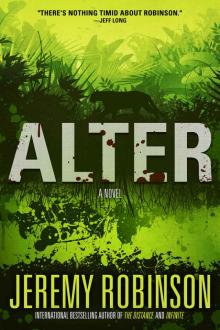 Alter
Alter From Above - A Novella
From Above - A Novella Flux
Flux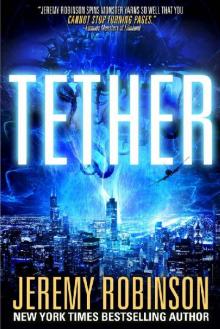 Tether
Tether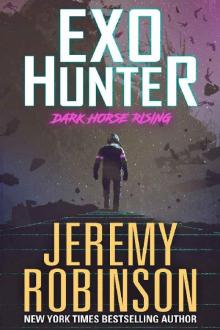 Exo-Hunter
Exo-Hunter Pulse
Pulse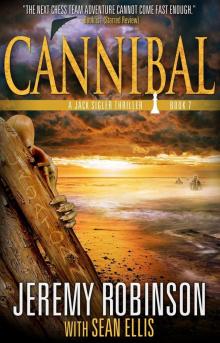 Cannibal
Cannibal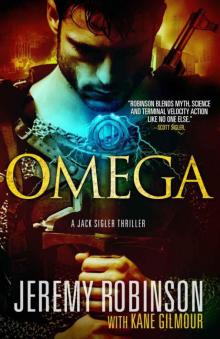 Omega: A Jack Sigler Thriller cta-5
Omega: A Jack Sigler Thriller cta-5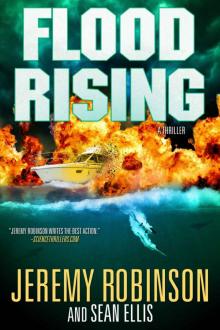 Flood Rising (A Jenna Flood Thriller)
Flood Rising (A Jenna Flood Thriller)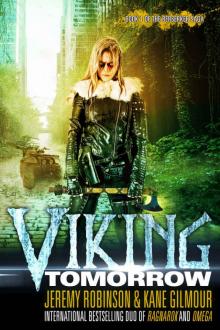 Viking Tomorrow
Viking Tomorrow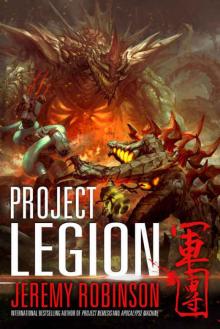 Project Legion (Nemesis Saga Book 5)
Project Legion (Nemesis Saga Book 5) BENEATH - A Novel
BENEATH - A Novel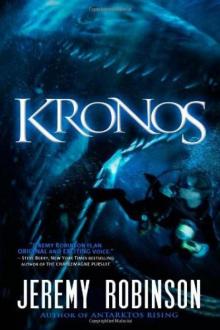 Kronos
Kronos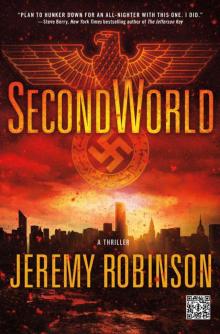 SecondWorld
SecondWorld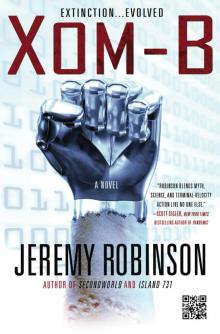 XOM-B
XOM-B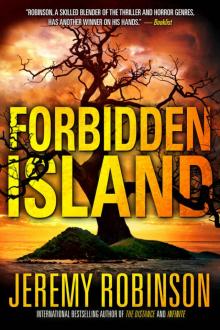 Forbidden Island
Forbidden Island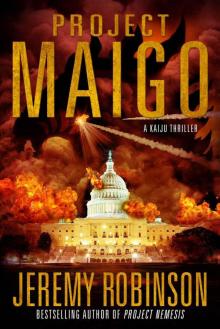 Project Maigo
Project Maigo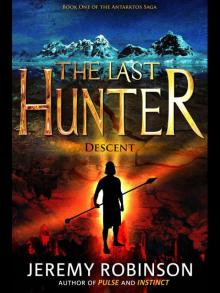 The Last Hunter - Descent (Book 1 of the Antarktos Saga)
The Last Hunter - Descent (Book 1 of the Antarktos Saga)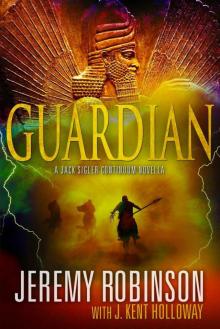 Jack Sigler Continuum 1: Guardian
Jack Sigler Continuum 1: Guardian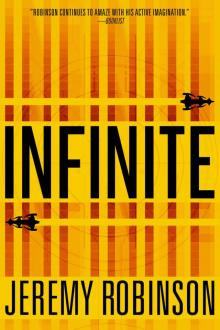 Infinite
Infinite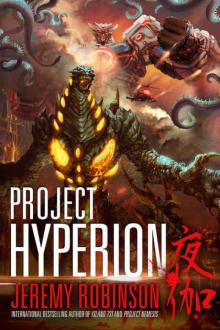 Project Hyperion
Project Hyperion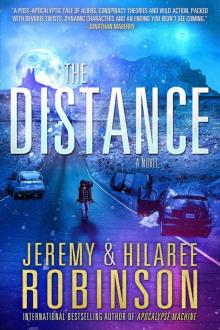 The Distance
The Distance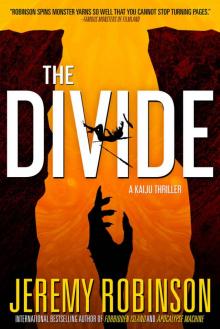 The Divide
The Divide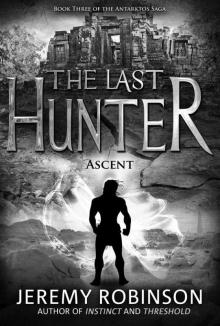 The Last Hunter - Ascent (Book 3 of the Antarktos Saga)
The Last Hunter - Ascent (Book 3 of the Antarktos Saga)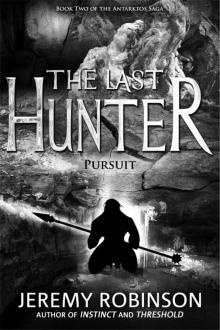 The Last Hunter - Pursuit (Book 2 of the Antarktos Saga)
The Last Hunter - Pursuit (Book 2 of the Antarktos Saga)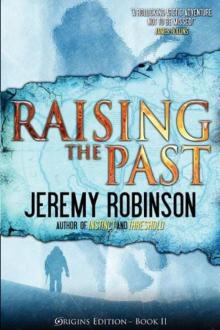 Raising the Past
Raising the Past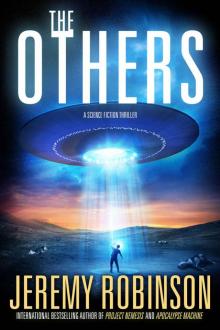 The Others
The Others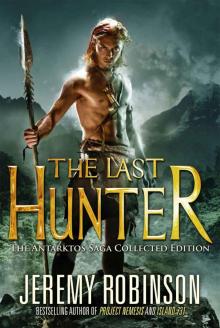 The Last Hunter - Collected Edition
The Last Hunter - Collected Edition Threshold
Threshold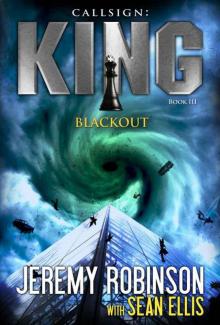 Blackout ck-3
Blackout ck-3 Antarktos Rising
Antarktos Rising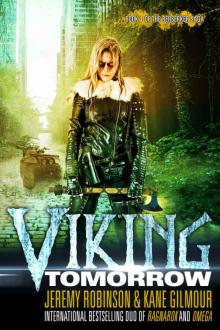 Viking Tomorrow (The Berserker Saga Book 1)
Viking Tomorrow (The Berserker Saga Book 1)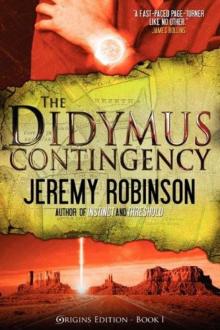 The Didymus Contingency
The Didymus Contingency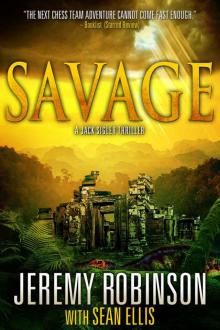 Savage (Jack Sigler / Chess Team)
Savage (Jack Sigler / Chess Team)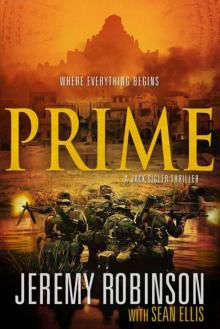 Prime
Prime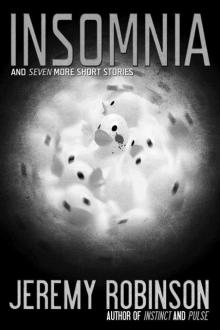 Insomnia and Seven More Short Stories
Insomnia and Seven More Short Stories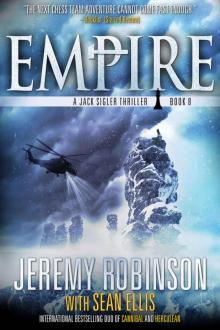 Empire (A Jack Sigler Thriller Book 8)
Empire (A Jack Sigler Thriller Book 8)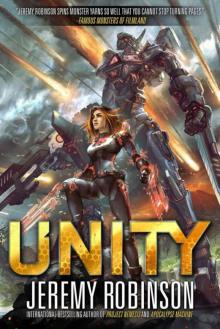 Unity
Unity Instinct
Instinct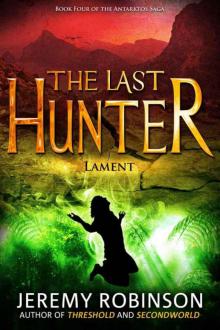 The Last Hunter - Lament (Book 4 of the Antarktos Saga)
The Last Hunter - Lament (Book 4 of the Antarktos Saga)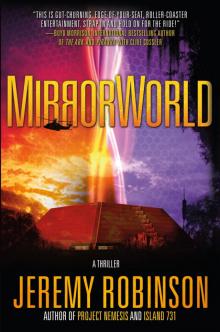 MirrorWorld
MirrorWorld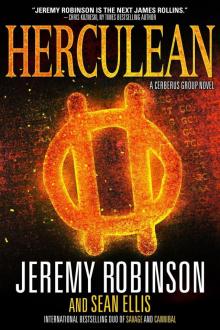 Herculean (Cerberus Group Book 1)
Herculean (Cerberus Group Book 1) Island 731
Island 731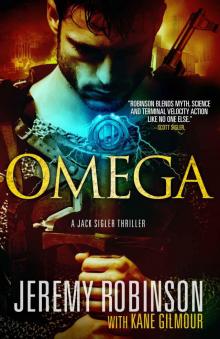 Omega: A Jack Sigler Thriller
Omega: A Jack Sigler Thriller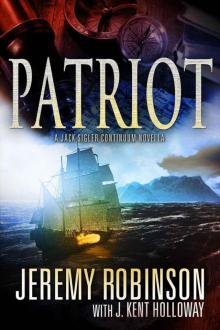 Patriot (A Jack Sigler Continuum Novella)
Patriot (A Jack Sigler Continuum Novella)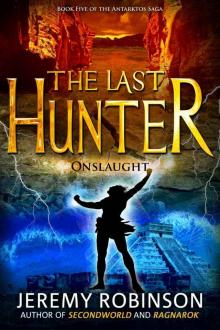 5 Onslaught
5 Onslaught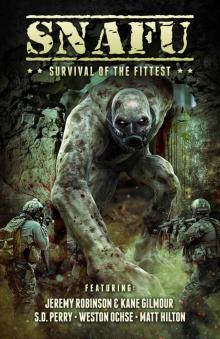 SNAFU: Survival of the Fittest
SNAFU: Survival of the Fittest Helios (Cerberus Group Book 2)
Helios (Cerberus Group Book 2)